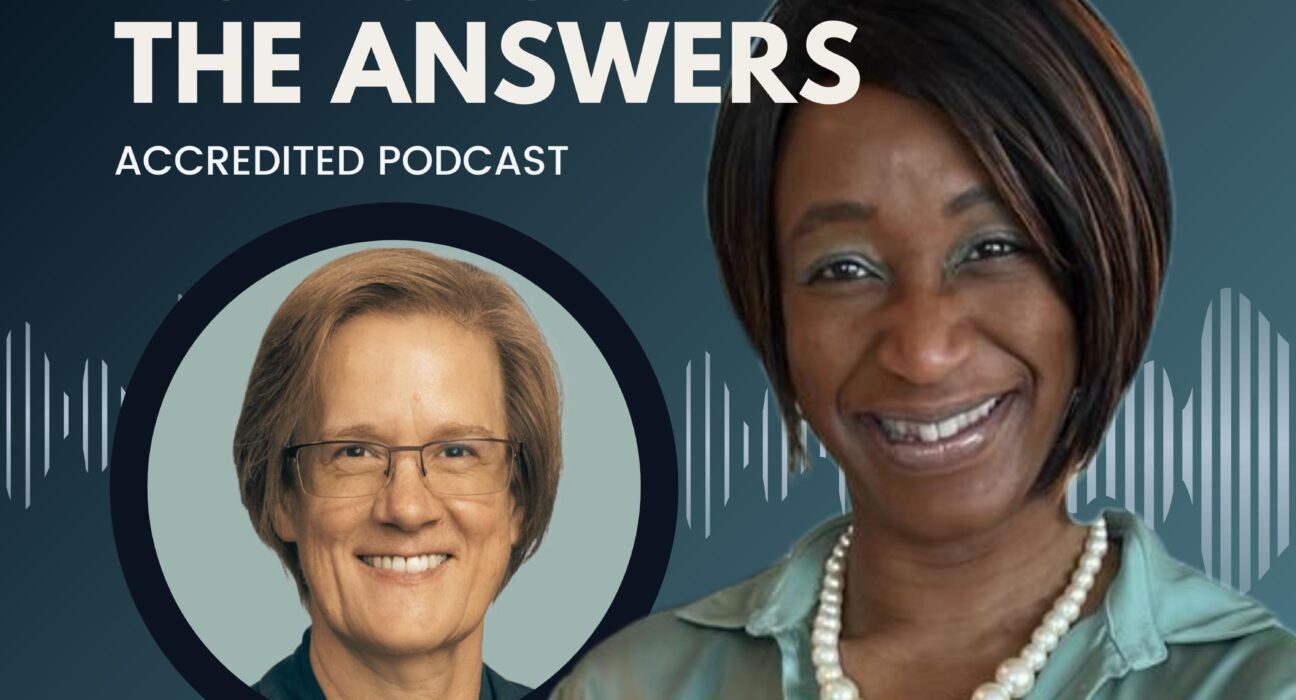
Dive into the complexities of Long COVID with our latest episode featuring Professor Michelle Harkins MD! Discover how patients can master their consultations and how physicians can spot critical symptoms. From symptom journaling to essential red flag alerts, this episode is packed with expert tips and insights to navigate the challenges of Long COVID recovery.
Guest – Professor Michelle Harkins
Note: The podcast has no bias. All conflicts of interest are highlighted with individual guests.
Healthcare Professionals | Earn 0.5 Certified Mainpro+® Credits! Please register/login to claim your CPD/ CEU credits.
Podcast Overview:
Family physicians often feel overwhelmed by the diverse and overlapping symptoms of Long COVID, with some mistakenly believing it to be psychological. Patients should prepare for consultations by organizing symptoms into prioritized groups, keeping a journal, and providing a brief history of their COVID-19 experience. Physicians should listen, conduct thorough histories, and perform basic evaluations, focusing on red flags like severe cardiac or pulmonary symptoms. Referrals to specialists may be necessary for progressive or severe cases. Collaboration with allied health professionals and community support groups is also crucial for comprehensive management and patient recovery. Join Professor Michelle Harkins to learn about diagnosis of Long COVID in Primary Care.
Highlights:
- How to communicate symptoms and concerns clearly with doctors.
- Key red flags that every physician should recognize in Long COVID cases.
- The importance of symptom journaling for tracking progress.
- Practical recovery tips to enhance patient outcomes.
- Insights into navigating the complexities of Long COVID consultations.
DISCLAIMER: The information in this podcast is provided for informational purposes only. You should not use any information discussed in this podcast and related materials to make medical or healthcare related decisions. Always consult a your physician or other qualified health care provider with regards to diagnosing managing your medical condition. Any medications or treatments, including any discussed in this podcast, should be initiated and managed by a qualified health care professional.
Podcast Transcript:
Healthcare Professionals: Please note to claim Certified CPD / CEU credits toward your medical license (Canada & reciprocal CPD/CEU Worldwide), you will need to register or log in.
Episode 7 – Diagnosing Long COVID in Primary Care ft. Professor Michelle Harkins
[00:00:00] Funmi Okunola: The information in this podcast is provided for informational purposes only. You should not use any information discussed in this podcast and related materials to make medical or healthcare related decisions. Always consult your physician or other qualified healthcare provider with regards to diagnosing and managing your medical condition. Any medications or treatments, including any discussed in this podcast should be initiated and managed by a qualified healthcare professional.
Funmi Okunola: Welcome to Long Covid – The Answers. Today’s Episode is entitled “Diagnosing Long Covid in Primary Care”. I’d like to introduce Professor Michelle Harkins. Professor Harkins is a Professor of Medicine at the School of Medicine at the University of New Mexico in the United States of America. She is the Division Chief of Pulmonary Critical Care and Sleep Medicine Co-Chief of the Adult Center for Critical Care there.
Professor Harkins managed many COVID-19 survivors during the pandemic in the Medical [00:01:00] Intensive Care Unit. She continues to conduct research on COVID-19 and Long COVID, and plays an active role in Project ECHO, a telehealth program that provides real time education and case discussions for community health practitioners for the management of Long COVID in the community.
Professor Harkins recently spoke at the Health, Education, Labor and Pensions, or HELP, Senate Committee meeting on Long COVID, hosted by Senator Bernie Saunders in January 2024. Welcome, Michelle.
Michelle Harkins: Thank you so much, I’m pleased to be here.
Funmi Okunola: Michelle, do you have any conflicts of interest to declare?
Michelle Harkins: No, I do not.
Funmi Okunola: Thank you. Can you share with us your experiences of managing people suffering from COVID-19 during the pandemic and how you came to be involved with managing Long Haulers?
Michelle Harkins: Sure. As a pulmonary and critical care physician and the Director of our group, I was on the frontline helping [00:02:00] write our hospital protocols, treating the first patients that we accepted into our ICU, and then helping expand our ICU capacity as the needs rose.
I’ve always been interested in infectious respiratory diseases and wanted to participate in some clinical trials to find something to help these patients. I was a point person for all the clinical trials for Acute COVID and brought many NIH and industry sponsored trials to University of New Mexico. Then as we started recognizing the lingering effects of the virus, and we finally came out from under our overwhelming acute care needs, I started to focus on Long COVID, both clinically and from a research and education perspective.
Funmi Okunola: Well, that’s fantastic, and we’re so grateful to have the likes of you helping everybody.
For those who don’t know, can you please explain Project ECHO and the Post COVID program you’re a part of in New Mexico, and how you’re using this scheme to train healthcare practitioners in the [00:03:00] community?
Michelle Harkins: Well, Project ECHO, which stands for Extension for Community Healthcare Outcomes, is a collaborative model of medical education and care management.
It was originated at the University of New Mexico in 2003 with Hepatitis C as the model disease, and it supports knowledge sharing between professionals from across a variety of healthcare specialties, and it facilitates the exchange of specialist’s knowledge and best practice to the local communities.
It’s really a tele-mentoring project, and it empowers and trains local primary care and ancillary care providers to be their community expert so that the patients don’t have to travel or come to a university setting and they can get state of the art care in their own community. I participated in ECHO with asthma programs, complex care programs, and I started our critical care for the hospitalized COVID-19 patients when we were [00:04:00] actively learning what correct therapy should be. Now I’m the co-director for the Post COVID Primary Care Echo, and it provides real time advice, case discussions, and dissemination of the most current, best practices and updates on research. We typically have experts present on a variety of topics and review cases to help providers learn more about Long COVID, as well as what are the treatment options that may or may not be available at this time.
Funmi Okunola: Gosh, that’s wonderful. I wish we had that in our area. Focusing in on primary care, your family physician or GP is going to be your first port of call for help with Long COVID in medicine. For most Long Haulers this experience has been stressful as they are met with confusion, dismissal, or absence of care.
For Family Physicians, most feel overwhelmed with the number of symptoms and overlap in pathology. There is still a belief that nothing can be done [00:05:00] or disbelief from some who think it’s psychological, though after watching a few episodes of this series, we hope that should be dispelled. So, bearing all that in mind, Michelle, how should the Long Hauler prepare for a consultation with their primary care physician? They can have a multiple number of symptoms. How would you advise them to rationalize these?
Michelle Harkins: Well, I would say you want to give a brief history of your COVID-19 illness. One, where you’re hospitalized or not, and then any new or worsening symptoms or problems that you’ve had since that infection, and I would suggest that you organize into groups – your symptoms into groups and by which symptoms are most important or impressing to you.
Think about what you used to be able to do prior to COVID and now what can you do specifically or what can you not do. What are your limitations. Sometimes keeping a journal to write things down might be handy, and then you can provide that [00:06:00] information to your provider. I know it’s overwhelming for the patient with multiple symptoms, but it’s just as overwhelming to your provider to come with a multitude of symptoms.
So, if you can work on organizing your thoughts and putting them in a tier of what’s most important to work on first, I think that’ll help. I also think if you know what improves your symptoms or the things you’ve tried. Be prepared to talk about your sleep patterns, your diet, your medications, and just asking what can be done to improve your symptoms or are there Long COVID clinics that you can be referred to or other support groups. So, I think organizing your thoughts and presenting them even physically to your provider may help.
Funmi Okunola: Great, thank you. What should the family physician’s initial evaluation of a person suspected to have Long COVID be?
Michelle Harkins: Well, I think the first thing is to really listen to your patient and tell them that you hear them and believe them so that you can [00:07:00] engender some trust and that you’ll work together to find treatments.
But really, back to the basics, doing a good history and physical is key. I want you to observe the breathing pattern, observe their posture, their vitals, and you may want to do just basic lab work and a very thorough evaluation, but really just start with some of the basic things like chem seven, CBC, thyroid functions, maybe an oxygen saturation test, or have them walk around in your clinic to measure their oxygen level.
There aren’t specific blood tests for that diagnosis of Long COVID. There are many tests that can be ordered, but I think they’re expensive and not helpful. So just stick with the basics, good history and physical, and a basic blood panel potentially to work up their symptoms, and then further work up based on their complaints.
Funmi Okunola: This is fantastic, Michelle. Thank you. It’s really making things a lot clearer. What part of the medical [00:08:00] history should they focus on? What are red flag symptoms indicating dangerous associated disease to look out for?
Michelle Harkins: Well, I tend to focus on the severity of their physical and even mental limitations and their patterns of symptoms.
Is there a component of anxiety or depression that may be impacting all of their symptoms as well? So, you have to think about that. But really noting what they could physically do before and after COVID, and what was the trajectory of symptoms would be important. I also want to know about their underlying medical issues and how severe their COVID infection was. But really asking about cardiac and pulmonary symptoms such as palpitations, syncope, severe dyspnea, or sleep disturbances, I think would be important. If they have acute chest pain, or progressive symptoms, and acute episodes of shortness of breath, I think those are definitely red flags that need further investigation.
Funmi Okunola: What would they [00:09:00] be looking for or bearing in mind with those red flags?
Michelle Harkins: So, I think focusing on cardiac and pulmonary exams – is there an abnormality to the pulmonary exam that may suggest they have interstitial lung disease? Are they having acute shortness of breath and chest pain that you might think about a pulmonary embolism or an acute pneumothorax? If they have progressive symptoms, despite simple symptoms, those could be red flags that there may be another condition that they need to be looking for.
Funmi Okunola: Okay. Could you give an example of one of those?
Michelle Harkins: Cardiomyopathy, maybe a heart failure, uh, myocarditis and again, like I mentioned, pulmonary embolism.
So, your leg swelling or sudden acute shortness of breath or a chest pain that is pleuritic in nature may suggest a pulmonary embolism. Certain things that you’re going to have to act on more acutely. They could also have [00:10:00] acute cardiac dysfunction like an MI, otherwise unilateral findings on a physical exam might suggest you need to do more imaging and take things a little bit on a quicker pace.
Funmi Okunola: Great, and for our non-medical audience, myocarditis is an inflammation of the heart muscle, pulmonary embolism is a clot in the lung, both of which can cause death in certain scenarios, and myocardial infarction is a heart attack.
What are the most common Long COVID symptoms, and how can they be practically diagnosed and managed in the community?
Michelle Harkins: I see the most common being brain fog or confusion, fatigue, and breathlessness on exertion, and even at rest.
Some patients have headaches and dizziness as well, and I tend to think of them as clustering groups. So, you have some patients that have more Cardiopulmonary, shortness of breath, chest pain type symptoms, some that have [00:11:00] fatigue and Post Exertional Malaise, meaning they are just wiped out after minimal exertion, and some go into the autonomic dysfunction or chronic pain. Then there are those that have neuropsychiatric complaints. Again, some cognitive but also some anxiety and maybe even depression. There are questionnaires that can assess functional status and depression and anxiety. But I think that separating out each of these Long COVID symptom groups may help you then move forward and referring to maybe community support groups or online support groups.
Maybe patients need individualized exercise program with physical therapy or cognitive behavioral therapy. Maybe even breathing exercises could help those that have breathlessness.
Funmi Okunola: Yeah, this is great. You’re really making everything clear, and what’s coming out of all of this is this can’t be done in a 10-minute consultation.
[00:12:00} This is going to be a series of appointments, and I guess both the Family Physician and the Long Hauler are going to have to be patient with the progress that is made over a series of appointments.
Michelle Harkins: Right, and that’s why I suggest for the patient prioritize your symptoms. What are the most problematic symptoms? Then work in a tiered fashion, and for the provider think about the history of physical. If there’s something you find that should trigger you to maybe take a different path and maybe what the patient is thinking because there’s something more pressing you’re finding and you want to do an evaluation on that first, but it is a multi-step process that isn’t going to be solved. Even in a pulmonary clinic, I have to see patients back with their dyspnea and exertional dyspnea and do stepwise evaluations to try to help the patients feel better.
Funmi Okunola: Great. Thank you. When should a primary care physician refer to a specialist? [00:13:00]
Michelle Harkins: Well, when I think the best time to refer to a specialist is if you have a patient that has really severe symptoms maybe out of proportion to your findings, or they have a very progressive disease, progressive chest pain, progressive shortness of breath, they could walk a mile now in a week they can walk half a block, and then the next week they can walk a few steps.
I mean, things like that, progressive disease, you should consider a referral right away. If the patient has desaturation, you may need to refer to a pulmonary provider, meaning the low oxygen levels with exertion. We typically will see these patients in our clinic after at least three months from their acute infection if they’re still very short of breath or they need oxygen or they have progressive symptoms.
I think the patient will need reassurance of course if you are uncomfortable or have questions about the diagnosis of Long [00:14:00] COVID or what may be going on with the patient, then it would be appropriate to refer.
Funmi Okunola: So, when you see them in your specialist clinic, the ones with decreased oxygen saturations, difficulty in breathing, what diagnoses are you finding and how are you managing them?
Michelle Harkins: So sometimes patients have a worsening underlying disease. Maybe they had asthma or COPD and then they develop COVID, and then their symptoms are exaggerated so they’re needing to use their inhalers more. There is a certain subset of patients that have a pulmonary embolism later or that blood clot to the lung or a lung collapse from changes that occurred when they were on the ventilator in the ICU for example for COVID.
There are also patients, if they were on a ventilator, who may have a tracheal stenosis or a blockage in their upper trachea because they were on a ventilator for a long period of time. The majority of our patients, [00:15:00] however, seem to fortunately get better over time. So, they come in, they may have shortness of breath, they may have been discharged with oxygen. We follow them over several months to a year and they get off oxygen and their breathlessness improves, but not everybody does that. So, I look for worsening bronchospasm, a worsening underlying pulmonary disease that may not have been discovered before – fibrosis, or other things such as blood clots.
Funmi Okunola: Oh, fantastic answer. Thank you. I’m really learning from this whole interview. What other allied healthcare professionals can a GP draw on in the community to help with the management of Long COVID?
Michelle Harkins: I rely heavily on our pulmonary rehab or physical therapists for example that can help patients learn to [00:16:00] do a little bit more activity potentially in a safe monitored environment.
I refer patients to our speech therapists that help them work with upper airway issues – occupational therapists. So, I have a variety of ancillary health care providers that are very helpful to us. You also might want to think about social services or counselors, community health workers that may be able to help these patients.
There are support groups that I also have referred people to or given patients examples of different support groups online that they could look through. You can also help them learn to do some self management techniques at home, but you can also join our Post COVID Primary Care ECHO and other such programs such as you’re hosting to learn more about Long COVID diagnosis and what to tell your patients.
Funmi Okunola: Thanks. It sounds like we need the type of ECHO project that you’re doing in New Mexico all over the [00:17:00] world really. I think we need to alert our governments because what you’re telling us is fantastic. Are there any off-label medications or vitamins that you would advise family physicians trial for relief of Long COVID such as low dose naltrexone, antihistamines, non- steroidals and coagulants? If so, how would a GP work out which group of patients might be appropriate for which treatments?
Michelle Harkins: This is a tough question because we don’t have a lot of data. I’m a data kind of driven person, but there are several small studies showing potential benefits for a variety of agents, though these small studies may or may not have had a control group. They may have been done in a single center. They may be retrospective and so it makes it a little hard to make broad recommendations, but I think that there are some better data coming out to support [00:18:00] antihistamines. There are a few single center studies that have shown benefit from low dose naltrexone, but what I hope to understand with my work and along with clinical trials is to really understand from some of these medications and put them in larger clinical trials so that we know that it is helpful. I think antihistamines and like I mentioned there are two studies looking at this.
One gave famotidine 40 milligrams twice a day in a randomized control fashion in patients with and without Long COVID, and there was improvement in so many mental status exam and mocha scores at 6 and 12 weeks compared to those that didn’t get antihistamines. I do know there are some providers using them. They’re relatively well tolerated. I’m not necessarily endorsing them, obviously, but I think people use those and I think they use low dose naltrexone in [00:19:00] a one to two-to-three-month period of time for pain, as well as help with a variety of other symptoms of Long COVID.
There are some studies looking at L-Arginine and Vitamin C that seem to be reasonable. Again, very small groups of patients – 20 patients at a time, but it did help with fatigue scores and maybe even hand grip or six-minute walk. Very interesting data coming out now but a little hard to make broad recommendations for specific types of patients.
Funmi Okunola: Thanks. We have a disclaimer at the beginning of this program whereby we advise people to seek the help of a healthcare professional not rely on this. I’m interested in hearing is there anything that you particularly use for your Long-Haul patients? With regards to the antihistamines, who gets them? Is it people with mast cell activation type symptoms or?
Michelle Harkins: There are yes in our [00:20:00] Long COVID clinic. Patients may get antihistamines for that particular process, but we also have patients who have a lot of neuropsych components and depression and anxiety that have been trialed with this as well.
Some of our psychiatrists who also work in conjunction with our Long COVID clinic have used these antihistamines and seen improvement; not everybody, but they have seen improvement in some of the anxiety and depression scores and many mental statuses. So, for those patients it’s worth a trial maybe for a month to see if they seem to have any improvement on that.
Those other agents potentially probiotics that may help with the gut dysbiosis because there’s a big gut brain access that can affect how we do Post COVID. I think our clinics are using some antihistamines and some low dose naltrexone
Funmi Okunola: Okay. Thank [00:21:00] you. What are the biggest barriers to rehabilitation and recovery of Long Haulers?
Michelle Harkins: I think there are a lot of barriers. We don’t have the data to tell us what works for anyone, much less everyone. Long COVID is very complex with many potential mechanisms pathophysiologically. There are millions of patients with Long COVID that are suffering and have been for some time, but there’s also a limited number of providers and ancillary services to be able to care for all of these patients.
I also think a barrier is having the patients believed, and having a therapeutic relationship with a primary care provider is not always there, and I think that is a barrier for some patients. I think continuing to educate providers about Long COVID – what are the basic things that they can do to best serve their patients is important because care needs to be individualized and it’s not a one size fits all for a treatment plan. [00:22:00] Learning what’s going to work for patients is going to take time through good clinical trials, but everybody wants an answer now. So, there are a lot of barriers, but I think we’re actually making some progress now and moving forward.
Funmi Okunola: Great. How can the Family Physician work in partnership with the Long Hauler to facilitate best care?
Michelle Harkins: Well, as I mentioned before, you know, believe in your patient and tell them that, and that you’re going to work together on solutions as science advances to understand treatments that may be beneficial. Give them tools for some self-management and some reassurances.
Now, they have a significant disease with a lot of morbidity for them, but it may not be life threatening. So, reassuring them that you haven’t found anything horribly drastic that’s going to alter their life immediately would be important, and I think providing support group information or clinical trial information that they could participate in, and [00:23:00] then seeing them and follow up relatively frequently to assess their response to different things you may have tried. So, building a partnership on trust and telling them that you hear them is the most important thing, I think.
Funmi Okunola: Wow. Thank you, Professor Hawkins, for today’s interview. It’s absolutely brilliant and exactly what I had in mind for all the listeners and thank you for all that you do for Long Haulers.
Michelle Harkins: Thank you for inviting me. It’s been a pleasure.
[00:24:00]
Funmi Okunola: Some questions for listeners to consider.
What are your top five takeaways from this episode?
How will this episode change your practice or perception of this disease?
What will you do to act on what you’ve learned?
Please discuss your thoughts on our social media outlets such as Twitter or X, our website blog, Instagram, Facebook, LinkedIn.
Please rate this episode.
SHOW NOTES:
Dr Funmi Okunola MD interviews Professor Michelle Harkins MD – Professor of Medicine at
the School of Medicine at the University of New Mexico in the USA about how to diagnose Long COVID in Primary Care. Professor Harkins runs a Post COVID clinic and Project Echo telehealth program that provides real time education and case discussions for community health practitioners for the management of Long COVID in the community.
1. Pinto MD, Lambert N, Downs CA, Abrahim H, Hughes TD, Rahmani AM, Burton CW,
Chakraborty R. Antihistamines for postacute sequelae of SARS-CoV-2 infection.
The Journal for Nurse Practitioners. 2022 Mar 1;18(3):335-8.
2. Brennan CM, Nadella S, Zhao X, Dima RJ, Jordan-Martin N, Demestichas BR,
Kleeman SO, Ferrer M, von Gablenz EC, Mourikis N, Rubin ME. Oral
famotidine versus placebo in non-hospitalised patients with COVID-19: a
randomised, double-blind, data-intense, phase 2 clinical trial. Gut.
3. Tosato M, Calvani R, Picca A, Ciciarello F, Galluzzo V, Coelho-Júnior
HJ, Di Giorgio A, Di Mario C, Gervasoni J, Gremese E, Leone PM. Effects
of l-arginine plus vitamin C supplementation on physical performance,
endothelial function, and persistent fatigue in adults with long COVID: a
single-blind randomized controlled trial. Nutrients. 2022 Nov
4. O’Kelly B, Vidal L, McHugh T, Woo J, Avramovic G, Lambert JS. Safety and efficacy of
low dose naltrexone in a long covid cohort; an interventional pre-post study.








